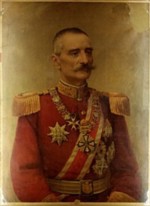Kosovo
It's 333 km by road from Skopje in North Macedonia to Shkodër in Albania, passing through Kosovo. Thus, we were in three countries in a day. Yet, as we were soon to discover, this is not unusual in the Balkans.
Unfortunately, the Fiat Tipo we had hired is a bit gutless (1.4 litres). Its 6 speed box doesn't help a lot in the mountains - much of the time my foot was pressed to the metal to stay anything near the 130 speed limit and acceleration was painful.
I greatly preferred our previous car in Turkey: a diesel Ford Focus for which burning rubber was no challenge.
A 333 km drive but the roads were good and often clear like this
Yet driving did present some challenges in the Fiat when it was not a divided carriageway
Mainly other drivers: hesitant snails and daring hares
Overtaking - as I was obviously doing in the image above - could be problematic in some places
We didn't know what to expect in Kosovo, given the reported ongoing ethnic tensions after the 1998-99 Kosovo War. I looked it up...
This has been one of the most fought over locations in the world and at one time Prizren, where we stopped for lunch, was the capital of Serbia.
Wikipedia tells us that: "During the late 19th century the city became a focal point for Albanian nationalism and saw the creation in 1878 of the League of Prizren, a movement formed to seek the national unification and liberation of Albanians within the Ottoman Empire."
In 1912 the Balkan States overthrew Ottoman rule in an appalling bloody war with outrageous atrocities committed against Muslims. A reported 30,000 people fled Prizren for Bosnia. The following year the previous allies fell out and a second war, between Bulgaria and the rest, particularly Serbia. Bulgaria captured Prizren but lost the war.
Ethnic tensions continued during the First World War due in part to rivalry between the Bulgarian Orthodox Church and the Serbian Orthodox Church, which seem to have been even more bitter than those with the Muslims.
During the Second World War the Germans and Italians invaded and imposed an iron fist, suppressing ethnic rivalry. This caused the suppressed factions to unite as Partisans (guerrilla fighters). When the Axis was defeated, the old Kingdom was abolished. Josip Broz Tito, the leader of the Partisans, then took control under the patronage of the Russian 'liberators'.
In due course Tito became President of the newly reunited Socialist Federal Republic of Yugoslavia. Under his authoritarian rule, sectarian scheming was not tolerated and a number of 'show trials' including the 'Prizren trial', were conducted to demonstrate this.
Nevertheless, Yugoslavia prospered during the Cold War as a member of the non-aligned group of countries and Australians were free to travel there, returning with tales of wonderful times and places enjoyed.
But by 1991, when the Soviet Union collapsed, Tito was dead and Yugoslavia, now disunited once more, began to fall apart in ethnic and cultural rivalry - see the shelling of Dubrovnik in 1991 below.
In Kosovo the Serbs and Albanians were at each other's throats. The Albanians had begun attacking police and other government targets under the banner of the Kosovo Liberation Army (KLA).
Slobodan Milošević was the Serbian President of the Federal Republic of Yugoslavia (now just Serbia and Montenegro) and took a dim view.
With foreign encouragement the KLA began to obtain modern weapons (from the usual sources?). In February 1998, when the KLA was equipped and ready, a full-scale civil war broke out, with ground support from the Albanian army. Yet despite foreign support, in 1999 it was not going well. Serb forces responded by driving some 1.5 million Kosovo Albanians from their homes, many of which were burned.
The Clinton Administration in the US became concerned that the KLA might lose and after unsuccessfully trying to get UN Security Council support or negotiate a ceasefire, NATO airstrikes were used to end what had descended into an ethnically charged bloodbath.
When the war was over the Federal Republic of Yugoslavia was dismantled and Slobodan Milošević was arrested and charged with war crimes. Yet he remained a beacon for Serbian discontent until he died in gaol in 2006 - so I suppose that's all good now?
Anyway, we encountered no partisans or other dangers and the roads were mostly excellent - unlike some in Albania - and in Prizren the locals were very friendly and helpful and there was no sign of its bloody history. We had no local currency and few places accept cards so a man from a cafe personally directed us to a competing place in a food hall. It was adjacent to a supermarket that did accept credit cards, and it turned out to have excellent food. But some people are doing it tough. When we returned a vagrant tried the old car parking scam on us. As you can see my camera stayed in the boot.

